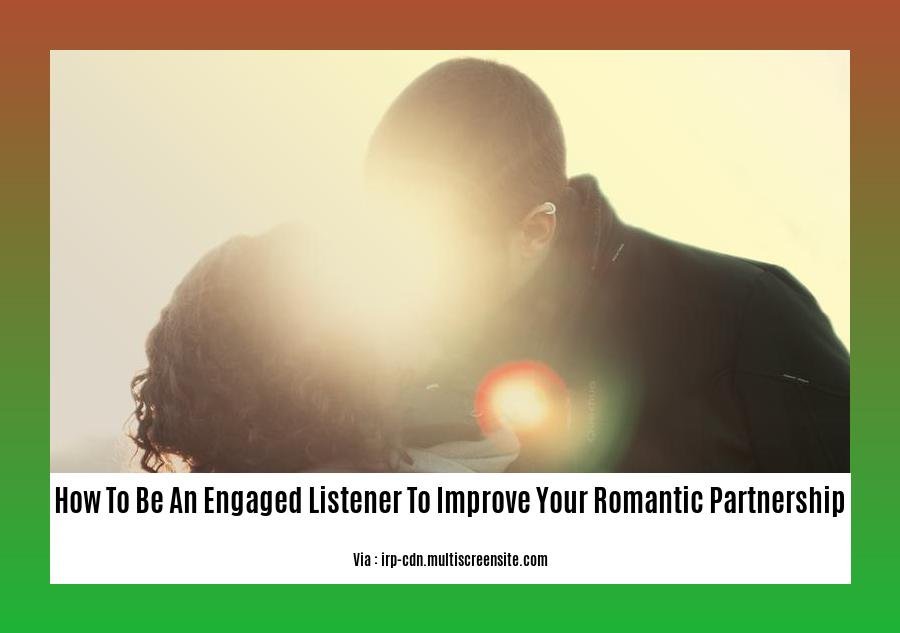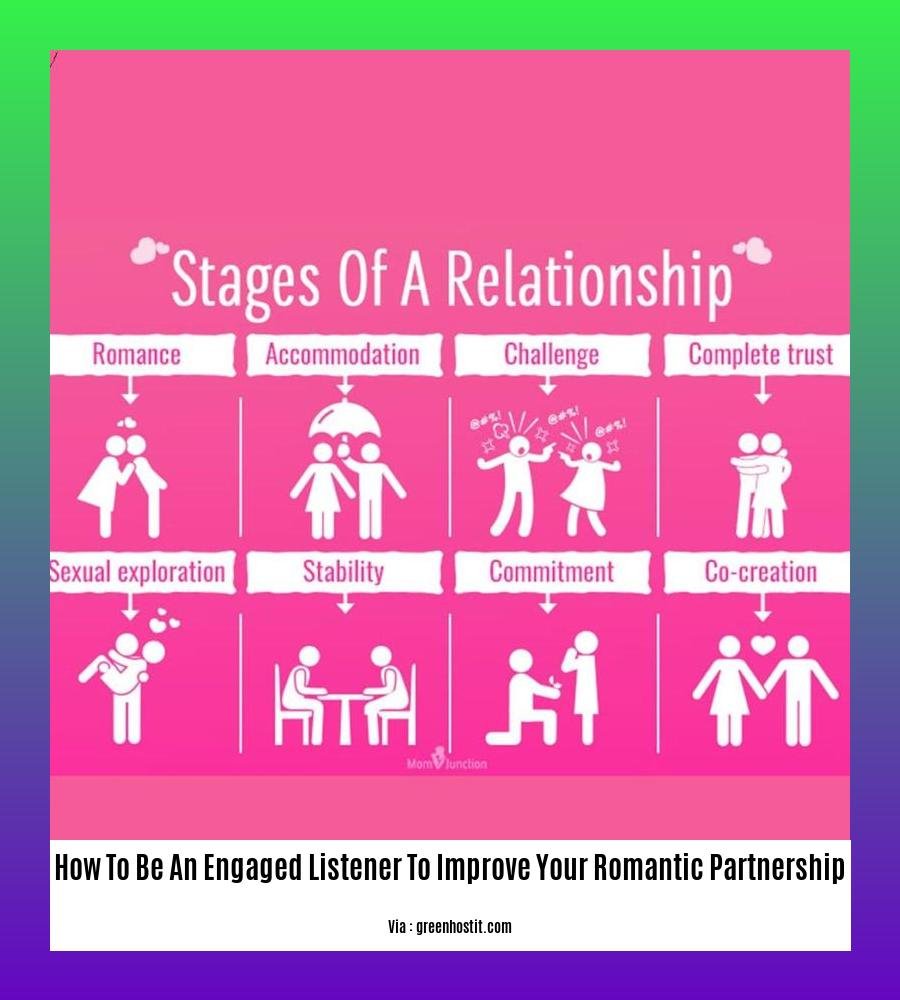Are you struggling to communicate effectively with your romantic partner? Do you feel like you’re not being heard or understood? If so, then it’s time to learn how to be an engaged listener. Engaged listening is a skill that can be learned and practiced, and it can make a world of difference in your relationship. In this article, we’ll discuss how to be an engaged listener and how it can improve your romantic partnership.
Key Takeaways:

- Prioritize understanding the other person’s perspective.
- Give undivided attention to the speaker.
- Pay attention to nonverbal cues like body language and tone of voice.
- Restate what you’ve heard to check for clarity.
- Acknowledge and validate the other person’s emotions.
- Ask open-ended questions to encourage deeper conversation.
- Summarize the conversation to show you’ve been listening.
How to Be an Engaged Listener to Improve Your Romantic Partnership
Listening attentively is an essential skill for successful romantic partnerships. Here are key practices to master:
Maintain Focus and Attention:
– Dedicate your presence to the speaker, eliminating distractions that hinder your understanding.
Observe Nonverbal Cues:
– Pay attention to gestures, body language, and tone of voice, as they convey subtle messages that complement spoken words.
Emphasize Understanding:
– Actively seek comprehension of the speaker’s thoughts and feelings, even if you differ in opinion.
Reflect and Summarize:
– Recap what you’ve heard and summarize it succinctly to demonstrate your comprehension and ensure accuracy.
Validate and Empathize:
– Acknowledge and respect the speaker’s emotions and perspective, conveying that you value their experiences.
Ask Questions:
– Encourage further elaboration and understanding by asking open-ended questions that invite more depth into the conversation.
If you need to develop strong communication with your partner, active listening skills are essential. You must learn various active listening strategies to make your partner feel truly heard. Additionally, there are proven techniques for empathetic listening to enhance intimacy.
Attentive pauses: The power of silence in engaged listening
When we truly listen, we open ourselves up to the possibility of a deeper connection. But what does it mean to listen attentively? It means being fully present, giving the other person our undivided attention, and allowing them to share their thoughts and feelings without judgment.
One of the most powerful tools we have in our listening toolkit is silence. Pausing for a moment before responding can give the speaker time to gather their thoughts, and it can also help us to process what they’ve said. By not rushing to fill the silence, we create a space for connection and understanding.
Why are attentive pauses so important?
- They allow the speaker to collect their thoughts. When we pause, we give the speaker time to gather their thoughts and feelings. This can be especially helpful if they’re feeling overwhelmed or emotional.
- They give us time to process what we’ve heard. Pausing also gives us time to process what we’ve heard. This allows us to better understand the speaker’s perspective and to respond in a more thoughtful way.
- They create a space for connection and understanding. Silence can be a powerful tool for creating a space for connection and understanding. When we pause, we show the speaker that we’re truly listening and that we care about what they have to say.
How can we use attentive pauses in our conversations?
- Pause before responding. Before you respond to someone, take a moment to pause. This will give you time to process what they’ve said and to choose your words carefully.
- Use verbal cues to indicate that you’re listening. While you’re pausing, you can use verbal cues to indicate that you’re listening. These cues can include nodding your head, making eye contact, and saying things like “I understand” or “I’m here for you.”
- Be patient. Pausing can take some practice. Be patient with yourself and with the other person. The more you practice, the easier it will become.
Key Takeaways:
- Silence is a powerful tool that can be used to improve our listening skills.
- Attentive pauses give the speaker time to gather their thoughts and feelings.
- Attentive pauses give us time to process what we’ve heard.
- Attentive pauses create a space for connection and understanding.
- We can use attentive pauses in our conversations by pausing before responding, using verbal cues to indicate that we’re listening, and being patient.
Citation:
The Power of Silence: Understanding the Role of Pauses in Active Listening
Clarification and validation: Encouraging your partner to elaborate
We all want to feel heard and understood in our relationships, and one of the best ways to do that is by clarifying and validating our partner’s feelings. This means asking questions to make sure we understand what they’re saying, and letting them know that we’re on their side.
Clarifying questions are a great way to show your partner that you’re listening and that you care about what they have to say. By asking questions, you can help them to elaborate on their thoughts and feelings, and to feel more understood.
Validating your partner’s feelings means acknowledging their emotions and letting them know that they’re okay. This doesn’t mean that you have to agree with them, but it does mean that you respect their feelings and that you’re there for them.
Key Takeaways:
- Clarifying questions help ensure understanding and initiate further discussion.
- Active listening and making partners feel understood are crucial for emotional validation in relationships.
- Validation creates trust, open communication, and enhances communication about sensitive topics in marriages.
Citation:
- How to Be an Active Listener in Your Marriage? 13 Ways:
Practice active listening: Daily exercises for empathetic communication
When it comes to improving communication within romantic relationships, there’s no denying the power of engaged listening. Imagine a world where your partner truly understands your deepest thoughts, emotions, and desires. A world where you can connect on a deeper level than ever before. This is the transformative potential of practicing active listening.
Key Takeaways:
- Active listening is the key to building strong and fulfilling connections.
- Daily exercises can improve your listening skills and deepen your understanding of your partner.
- Practice empathy, attention, and reflection to become an engaged listener.
Daily Exercises for Engaged Listening
- The Daily Debrief: Dedicate a short time each day to checking in with each other. Take turns sharing your experiences and listen fully to your partner’s perspective, free from distractions.
- The Reflective Mirror: When your partner is speaking, practice mirroring their body language, tone, and gestures. This helps you connect on a nonverbal level and shows that you’re engaged.
- The Empathetic Echo: As your partner speaks, occasionally rephrase their statements, reflecting their feelings and perspective. This demonstrates that you’re not just hearing their words, but understanding their emotions.
- The Open-Ended Inquiry: Ask open-ended questions to encourage your partner to elaborate and share more. This shows that you’re interested in their thoughts and feelings. Avoid interrupting or giving unsolicited advice.
- The Silent Observer: Practice pausing and allowing silence to enter the conversation. Sometimes, the most powerful moments happen when you’re not talking, but listening intently.
Remember, active listening is a skill that takes practice and conscious effort. By incorporating these daily exercises into your routine, you’re investing in the health and happiness of your relationship.
Relevant URL Source:
- The Power of Active Listening in Relationships











